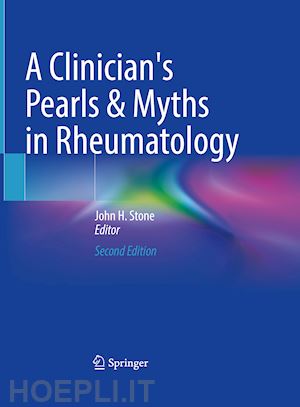
Questo prodotto usufruisce delle SPEDIZIONI GRATIS
selezionando l'opzione Corriere Veloce in fase di ordine.
Pagabile anche con Carta della cultura giovani e del merito, 18App Bonus Cultura e Carta del Docente
This book builds upon the first edition with new and improved chapters. The book explores the rich assemblage of clinical wisdom from expert rheumatologists from a wide range of specialties including Vasculitis and Sjogren’s syndrome. It examines the nuggets or ‘pearls’ of wisdom gained from collective clinical experience about the diagnosis or treatment of various diseases whilst also aiming to debunk myths that have influenced the practice of rheumatology by many clinicians.
The second edition of A Clinician's Pearls and Myths in Rheumatology is a critical resource for both practitioners and students of rheumatology. This book provides a clear guide for those wishing to take a “deep dive” into the diagnostic and therapeutic elements of rheumatology.
John H. Stone MD, MPH. Professor of Medicine, Harvard Medical School. The Edward A. Fox Chair in Medicine, Massachusetts General Hospital, Boston, MA, USA.
He writes: I have had a career-long interest in teaching, research, and clinical care of patients with rheumatic diseases; i.e., inflammatory diseases mediated by patients’ overly active immune systems. My work has focused on the systemic vasculitides, particularly ANCA-associated vasculitis and giant cell arteritis; IgG4-related disease (IgG4-RD); and glucocorticoid toxicity. Following medical school at Harvard Medical School, internal medicine training at Johns Hopkins, and a rheumatology fellowship at the University of California-San Francisco, I co-founded and directed the Vasculitis Center at Johns Hopkins University. This Center was the first in the United States to focus on inflammatory diseases of blood vessels such as ANCA-associated vasculitis and giant cell arteritis.
At JohnsHopkins, I directed the first NIH-funded, multi-center clinical trial in granulomatosis with polyangiitis. The results of this trial were published in The New England Journal of Medicine (2005). This trial paved the way for subsequent trials and investigations in vasculitis on an international scale. Work at the Johns Hopkins Vasculitis Center blazed a path for physicians all over the world interested in vasculitis, encouraging them to focus on research in this area. This effort ultimately served as the impetus for dozens of clinical trials in these diseases that have led to substantially better treatments for patients in less than 20 years.
In 2008, I was recruited to become the Director of Clinical Rheumatology at the Massachusetts General Hospital (MGH), where I have continued my interest in vasculitis from the research standpoint and broadened my clinical scope to include the full breadth of rheumatology. I was the Co-Principal Investigator on the Rituximab in ANCA-associated Vasculitis (RAVE) trial, funded by the Immune Tolerance Network at the NIH. This trial led to two New England Journal of Medicine papers and changed the standard of care for remission induction in this disease. RAVE formed the basis of approval of rituximab (Rituxan) by the U.S. Food & Drug Administration (FDA), the European Medicines Agency (EMA) for remission induction in ANCA-associated vasculitis.I have also been the global Principal Investigator of a multi-center clinical trial of interleukin-6 receptor (IL6R) blockade in giant cell arteritis. Giant cell arteritis is a disease that currently affects 300,000 Americans, and aside from prednisone there had been no other effective therapy known for nearly seventy years. The trial, known as GiACTA. This trial, conducted at 76 sites across North America and Europe, ledto a “breakthrough designation” for tocilizumab by the FDA for giant cell arteritis and approval by the agency in 2017. The drug has also been approved in Europe for giant cell arteritis, and in Japan it is approved for Takayasu’s arteritis, a related form of vasculitis, as well – all on the strength of this one trial. The primary results of this trial were published in The New England Journal of Medicine (2017). The trial demonstrated for the first time ever the availability of an effective steroid-sparing approach to the treatment of giant cell arteritis.
My second major research interest pertains to an emerging disease, IgG4-RD. My group at the MGH has identified several new disease associations with IgG4-RD, including lymphoplasmacytic thoracic aortitis, eosinophilic angiocentric fibrosis, Riedel’s thyroiditis, and midline destructive disease. My group also made the novel observation that B cell depletion with rituximab leads to swift, targeted declines in serumIgG4 concentrations (the other IgG subclasses remain stable), associated with dramatic clinical improvement. I was the first author on an NEJM Mechanisms of Disease paper in 2012 entitled “IgG4-Related Disease” and the senior author on a Lancet review (2014). I was the Principal Investigator on an NIH-funded R13 grant to conduct the world’s first International Symposium on IgG4-RD (2011). Three subsequent international symposia on IgG4-RD have followed, and a fifth is planned.
Finally, a burgeoning research interest in the last couple of years pertains to the measurement and prevention of steroid toxicity. Steroids remain the cornerstone of treating many immune-mediated diseases, but their toxicities are well-known and generally reviled by physicians and patients alike. I organized an international group of sub-specialty experts to create a Glucocorticoid Toxicity Index (GTI), designed for use as an outcome measurein











Il sito utilizza cookie ed altri strumenti di tracciamento che raccolgono informazioni dal dispositivo dell’utente. Oltre ai cookie tecnici ed analitici aggregati, strettamente necessari per il funzionamento di questo sito web, previo consenso dell’utente possono essere installati cookie di profilazione e marketing e cookie dei social media. Cliccando su “Accetto tutti i cookie” saranno attivate tutte le categorie di cookie. Per accettare solo deterninate categorie di cookie, cliccare invece su “Impostazioni cookie”. Chiudendo il banner o continuando a navigare saranno installati solo cookie tecnici. Per maggiori dettagli, consultare la Cookie Policy.